
Suspected radical Muslims set the church buildings on fire on the outskirts of Unguja Township, on the island off the coast of East Africa, in what church leaders called the latest incidents of a rising tide of religious intolerance.
“We don’t want churches on our street,” read a flier dropped at the door of Charles Odilo, who had donated the plot on which the Evangelical Assemblies of God in Tanzania (EAGT) building stood. “Today we are going to burn the church, and if you continue we are going to burn your house also.”
With Christian movements making inroads in the Muslim-dominated area, the EAGT church and a Pentecostal Evangelical Fellowship in Africa (PEFA) church building a few miles away were burned down as a fierce warning, church leaders said.
The PEFA church building was located in the Kibondeni area eight miles from Unguja, and the EAGT structure was in the Fuoni area six miles from Unguja. Samuel Salehe Malanda, pastor of the 30-member PEFA church, said their building doubled as a nursery school on weekdays.
“In this church building there were six benches and a blackboard,” Malanda said. “The children have no place to do their learning. What are we going to do?”
Construction of the PEFA church building was in the final stage of completion, area church leaders said, when Masoud Jecha, assistant sheikh of Kibondeni, visited it and threatened Malanda.
“If you do not stop your construction, we will bring down the building,” Jecha told the pastor.
Malanda said the church reported the arson attack to police, who have purportedly begun an investigation, and the congregation has also sought the help of the chief leader of the rural government. The church’s police report included mention of Muslim extremist suspects bent on stopping the spread of Christianity in Zanzibar.
Church leaders said Odilo, who had donated his plot for the EAGT church building, was living in fear of the Islamic militants burning down his house, as they are known for carrying out their threats.
Pastor Paul Makungu said his EAGT church has 29 adult members and 13 children. He has also filed an arson report with local police, who are investigating suspects including radical Muslims and the chief neighborhood leader.
Bishop Obeid Fabian, chairman of an association of congregations known as the Fraternal Churches, said Christians in Zanzibar have received several threats.
“In this latest incident, the threats were spread through pamphlets,” he said. “At other times, Muslim youths have hurled stones on church rooftops and insulted Christians.”
On May 9 Muslim extremists expelled Zanzibar Pentecostal Church worshippers from their rented property at Ungunja Ukuu, on the outskirts of Zanzibar City.
With no help forthcoming, church members have begun gathering for fellowship in their homes, Fabian said.
In Zanzibar City on April 17, government officials ordered Christians of the Church of God Zanzibar from their rented government building effective April 19, ostensibly to pave the way for renovations. But two months later, said pastor Lucian Mgayway, no renovation work had begun, and the government has since turned it into a business site.
The church had been worshipping in the building since October 2000.
“The churches affected since attacks began in April are at a critical stage,” said Fabian. “We as church leaders find it very difficult to bring our church members together who are now dispersed with no place of worship. The church needs financial support to get worship places for members as well security. But this seems not forthcoming.”
In predominately Sunni Muslim Zanzibar, churches face other hurdles. There are restrictions on getting land to build churches, open preaching is outlawed and there is limited time on national television to air Christian programs. In government schools, only Islamic Religious knowledge is taught, not Christian Religious Education.
Zanzibar is the informal designation for the island of Unguja in the Indian Ocean. The Zanzibar archipelago united with Tanganyika to form the present day Tanzania in 1964.
Muslim traders from the Persian Gulf had settled in the region early in the 10th century after monsoon winds propelled them through the Gulf of Aden and Somalia. The 1964 merger left island Muslims uneasy about Christianity, seeing it as a means by which mainland Tanzania might dominate them, and tensions have persisted.












































